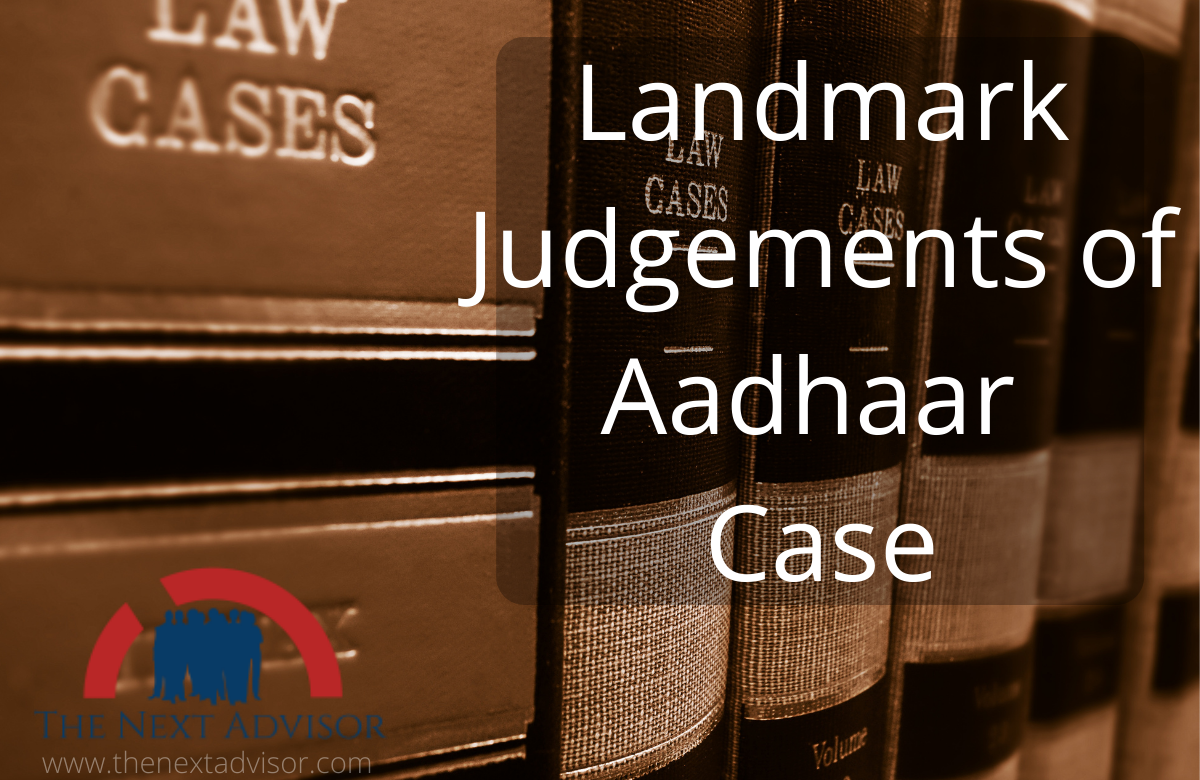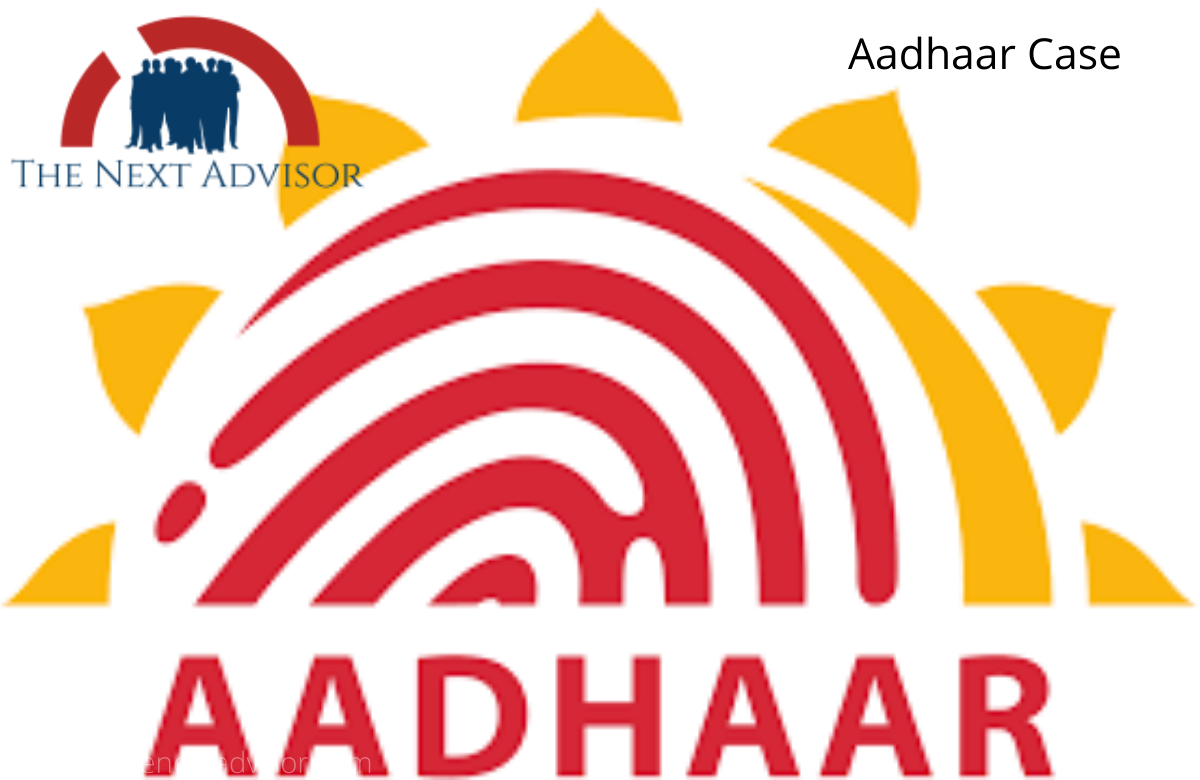Today I am going to explain to you the longest-running case of India. The Aadhaar case is that. Aadhaar is India’s National Identity project for which a new agency UIDAI was also created, then Aadhaar connects the biometric data of Indian residents such as Fingerprints, Eye scans, Facial Scans, and after that government gives them a 12 digit unique identification number. Now, what is the object of the Whole Scheme? So the main object of Aadhaar is to make public service delivery efficient and curb corruption. The government collects all the data and then uses it for different purposes. But what happens going forward is that the government of Aadhaar has to make mandatory to Adhaar and make it compulsory for many schemes like Public Distribution System, Mid Day Meals, Mgnrega, etc., The government also uses Aadhaar for all these welfare schemes. As soon as people come to know about this, they oppose it strictly. Collecting biometric data and making the Aadhaar mandatory is a violation of the Right to Privacy.
In 2012, K.S. Puttuswamy a retired former Judge of Karnataka High Court, filed a petition in the Supreme Court against compulsory to Aadhaar for these schemes and says that mandatory to Aadhaar for government schemes is a violation of the Right to Privacy. At the same time, he also said that the government welfare scheme should get everyone because it is the fundamental right of the people. Government cannot stop these welfare schemes because it is the Fundamental Right of every citizen to take benefits from government schemes. Now as the Supreme Court has given some important judgments related to Aadhaar on the basis of the Right to Privacy. Like, M.P.Sharma Case and Kharak Singh Case.
- M.P.Sharma Case:- 8 Judges Bench
- Kharak Singh:- 6 Judges Bench
Like in the M.P. Sharma and Kharak Singh case in which 8 and 6 Judge Benches held that the Indian Constitution does not guarantee the Right to privacy. Further, we see that some smaller benches of the Supreme Court, like the Meneka Gandhi Case, Govind V. State of MP, and R. Rajgopal Vs State of TN, Supreme Court say that Right to Privacy haw Constitutional protection. and small benches of Supreme Court stated giving Constitutional protection to Right to Privacy. It was happening now that the big Judges bench in these cases said that, “ Indian Constitution does not guarantee Right to Privacy “. And the small judge’s bench of the Supreme Court was giving Constitutional protection to the Right to Privacy.

Landmark Judgements of Aadhaar Case
We were confused because of these conflicting and confusing decisions. Whether Indian citizens have the Right to Privacy or not? But at the same time government had started compulsive and relate to Aadhaar with many things like Mobile Number, Open A Bank Account, Admission in Schools, Filing in returns. So it was being said that Aadhaar will be linked with your mobile number and Pan Card. Then only with one click Income Tax department, can check the account status of any person and will be able to track his expenses.
But why people were so nervous with Aadhaar?
Because your Fingerprint, your face scan, also your rating scan collected all this data by the government and government storing it on a central server. But if this data is leaked then anyone can misuse it for the wrong purpose.
See what used to happen earlier, if the Police had to search your house, to collect some evidence, they had to get the warrant from the Court. There will be some protocols that they have to follow and there will be procedures and there will be many other things. But in today’s date technology is so advanced that central agencies can access all these things with a single click, your account, your location, your conversation, so what is the need for police to come to your house now because with a single click it can be done. All information is known and therefore right to privacy is an important fundamental right.
Now, this case is divided into two parts.
One which talks about the validity of the Aadhaar Act Act and for which a five-judge bench was constituted and the Aadhaar scheme was challenged and the Second part in which the constitutional question discusses that right to privacy is a fundamental right or not and for this, a nine-judges bench was constituted.
Now in the first part, Justice KS Puttaswamy, in his objection, said that the government has saved all the data in a central server but there is no safety measure available to protect it. Any private agency can use this data for its private agenda and for what things the government uses this biometric data, it is also not regulated. At the same time, he said that all the welfare schemes like the Exemplary Mid Day Meal Scheme, it is a fundamental right in itself. That is why you cannot stop the common man from using these benefits from any region. On September 26th, 2018, a five-judge bench held the Aadhaar Act to be constitutionally valid and held that providing demographic or biometric data is not a violation of the fundamental rights. And also consider unconstitutional to some problematic Sections of the Aadhaar Act, Like Section Section. 57, Section 33,(1), Section.47, Section 2d, and they’ve been struck down or reframed.
Now coming to the second part, i.e., the section of right to privacy, first of all, it was said that the decision of MP Saheb Sharma case and Kharak Singh case regarding the right to privacy is not correct and it was said in front of the court that right to privacy. The basis of this right is part of the Article. 14, 19, 20, 21, 25, and in this, the foundation of the right to privacy is found. And there are many international conventions that consider the right to privacy as an important fundamental right. Proposing all these contentions, the Attorney General of India had to say that. And the Constitution and Framers of Constitution deliberately did not include such a right to privacy in the Fundamental Rights in the Constitution.
After hearing the arguments of both sides, the Supreme Court, while giving a landmark judgment and rolling down the judgment of its MP Sharma and Kharak Singh, declared the fundamental right to Right to Privacy. Declining on this railing, Navtej Singh Johar Vs. Union of India case was decided. In which Section 377 of IPC was called unconstitutional.

























